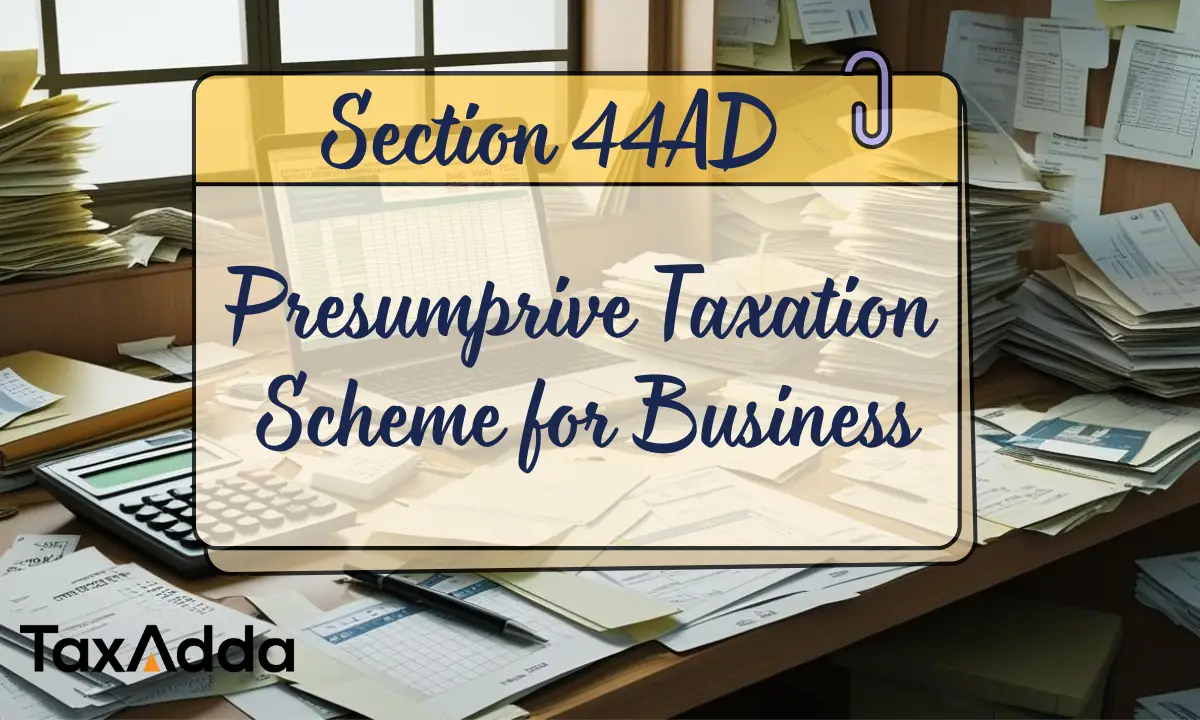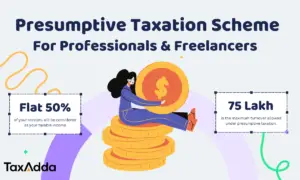Section 44AD
This section is for presumptive taxation for eligible small businesses to declare a fixed percentage of their turnover as taxable income, eliminating the need for detailed books or audits.
This Scheme gives you an option to compute your income on a presumptive basis (deemed profit), which is as follows:
- 8% of the total turnover or gross receipts from an eligible business is taken as the deemed business income for the year.
- This rate reduces to 6%, if the entire turnover or gross receipts are received via account-payee cheque, bank draft, ECS/other prescribed electronic modes
The purpose of this section is to give relief to small taxpayers from maintaining books of Accounts (u/s 44AA) for calculation of profit chargeable to Tax.
Eligible Assessee
- A resident individual, resident HUF, resident partnership firm but not a limited liability partnership firm.
- Who has not claimed deduction under any of the sections 10A, 10AA, 10B, 10BA, or deduction under any provisions of section 80-IA to 80RRB in the relevant assessment year.
The following persons are not covered under this section
- Profession of legal, medical, engineering, architectural, accounting, technical consultancy, interior decoration, film artist or authorised representative or any specified profession notified by the board under section 44AA. There is a separate provision for presumptive income for them in section 44ADA.
- A person earning income in the nature of commission or brokerage.
- A person carrying on any agency business.
Eligible Business
- any business except the business of plying, hiring or leasing goods carriages referred to in section 44AE; and
- whose total turnover or gross receipts in the previous year does not exceed an amount of Rs. 1 crore. Limit was raised to Rs. 2 crore from financial year 2016-17.
- Further the limit was again revised from Rs. 2Crore to Rs. 3 Crore from financial year 2023-24 subject to the condition that at least 95% of the total receipts is through online modes.
Extra Eligibility criteria from Financial year 2016-17
If a person claims lower profits than 8% of turnover in any of the 5 succeeding years, then such person cannot claim benefit of this section for next 5 years of the year in which lower profits are claimed. The words given in act are “Where an eligible assessee declares profit for any previous year in accordance with the provisions of this section and he declares profit for any of the five assessment years relevant to the previous year succeeding such previous year”. It is a confusion that if 5 succeeding year of “All years” are to be considered than what is sense of using “5” years, then it may be simply written that if lower profits are claimed in any year. It may mean that first year is considered as base therefore assessee should claim higher profit for minimum 6 years from assessee’s first year or year of applicability of this provision. Further clarification are sought from CBDT.
Provisions under section 44AD
In case an eligible assessee carrying on the eligible business, the profits and gains of such business is deemed to be 8% of the total turnover or gross receipts from such business. However, the assessee can claim higher profits.
From Financial year 2017-18, 6% is taken in lieu of 8% in respect of the amount of total turnover or gross receipts which is received by an account payee cheque or an account payee bank draft or use of electronic clearing system through a bank account.
However an assessee can claim profits to be lower than 8% by maintaining books of account as mentioned in section 44AA and gets them audited as per section 44AB. If the total income of asseessee (i.e 8% of turnover plus all other incomes) doesn’t exceed the maximum amount not chargeable to tax, then he is not required to maintain accounts and get them audited. (From Financial year 2016-17, if a person claims profits lower than 8% of turnover and get accounts audited then such person has to gets his accounts audited also for next 5 years from such year)
A confusion has been created when the limit under section 44AD is increased to Rs. 2 crore. It is now clarified by department that assessee with turnover of more than rs. 1 crore but less than rs. 2 crore and filing return under section 44AD is not required to conduct audit under section 44AB. Press Release – 20th June 2016
Deductions from deemed profit
No deduction of Section 30 to 38 (including unabsorbed depreciation) is allowed from such deemed profit.
Where the eligible assessee is a partnership firm, salary and interest to partners subject to section 40b are also not deductible from such deemed profit. (Till financial year 2015-16 such salary and interest to partners is deductible)
And also disallowance under sections 40,40A, 43B is not to be considered if income is deemed under this section.
WDV of depreciable assets
The written down value of any asset of an eligible business shall be deemed to have been calculated as if the eligible assessee had claimed and had been actually allowed the deduction in respect of the depreciation for each of the relevant years.
Advance Tax
Persons filing return under this section are also required to pay Advance tax. Freelancers/professionals opting for this scheme are required to pay advance tax in one installment only, on or before 15th March of the financial year.
It is very important to note here that If you opt for Section 44AD and also have other income sources (like salary, capital gains, interest, or rent), you can not take the benefit of the lump‑sum advance tax payment on March 15. Instead, Normal provisions of Advance Tax will apply & you must follow the standard four instalment due dates for Advance Tax
| Due Date | Period Covered | Advance Tax Payable |
|---|---|---|
| June 15 | 1 Apr – 15 Jun | 15% of total estimated tax liability |
| September 15 | 16 Jun – 15 Sep | 45% (cumulative) |
| December 15 | 16 Sep – 15 Dec | 75% (cumulative) |
| March 15 | 16 Dec – 31 Mar | 100% (cumulative) |
Note : Advance Tax is payable if your total estimated tax ( after 80C, TDS & Rebate u/s 87A etc.) exceeds Rs.10000 in a Financial Year.
TDS for Business opting for Presumptive taxation
Even as a presumptive taxpayer under 44AD (e.g., declaring 6% or 8% of receipts as income), if your gross receipts in last year exceeded Rs. 1 Crore, you must deduct TDS (Tax deducted at source)when making relevant payments (e.g., contractor fees, rent, professional services). The law specifically states that TDS provisions override presumptive schemes . Failing to do so can attract Late Fee, interest & penalties (e.g., deemed as ‘assessee in default’). You can check interest, late fee & penalties on Non-compliance of TDS & related provisions here TDS late deposit interest calculator
Due date to file Income Tax Return u/s 44AD
For Businesses opting for the presumptive scheme under Section 44AD, the due date for filing their Income Tax Return (ITR‑4/Sugam) aligns with the standard deadline under Section 139(1). Typically, this deadline falls on July 31st of the Assessment Year. However, for the FY 2024–25 (AY 2025–26), this deadline has been officially extended to September 15, 2025, for non‑audit cases—including Section 44ADA taxpayers—by the Central Board of Direct Taxes. You can check various due dates to pay Advance Tax, TDS , Income Tax & file Income tax return in our Tax Calendar


